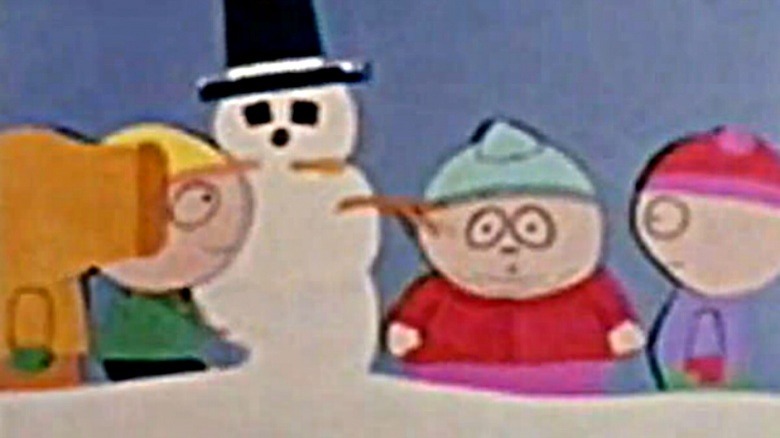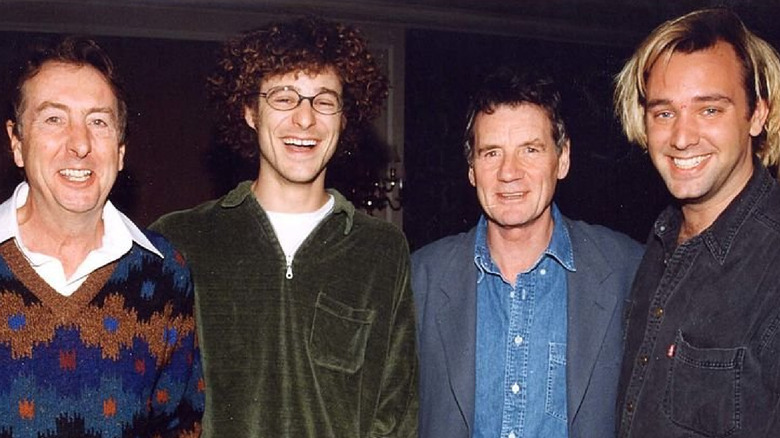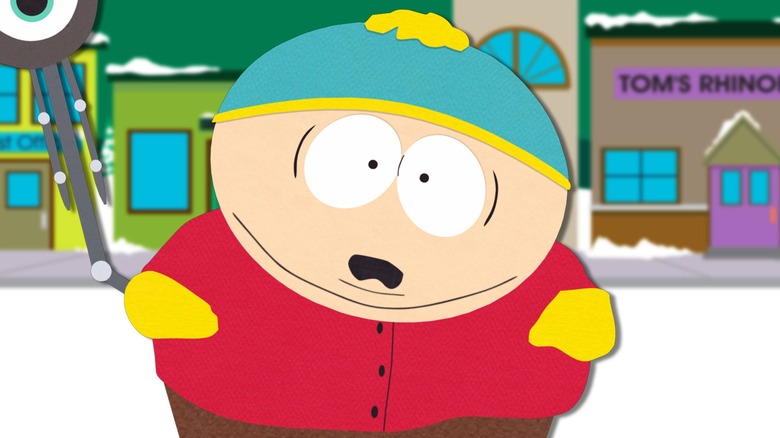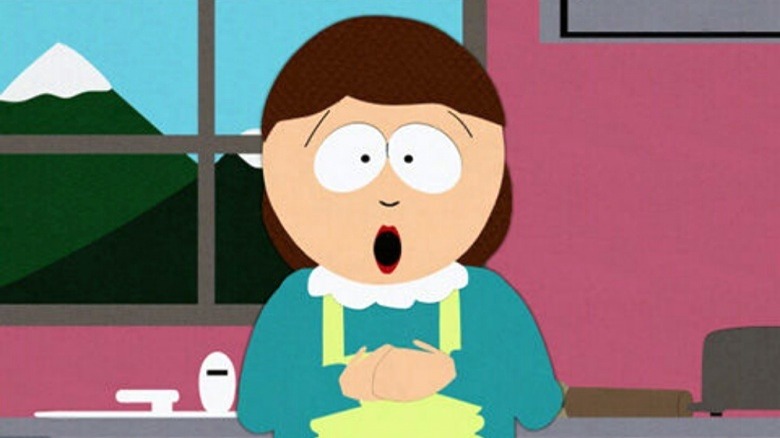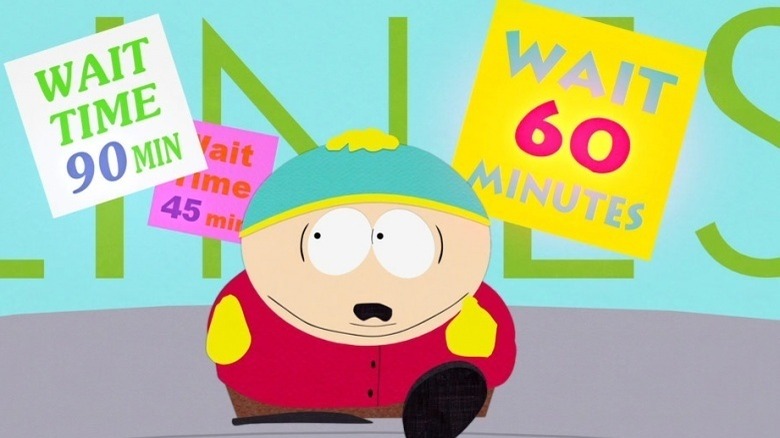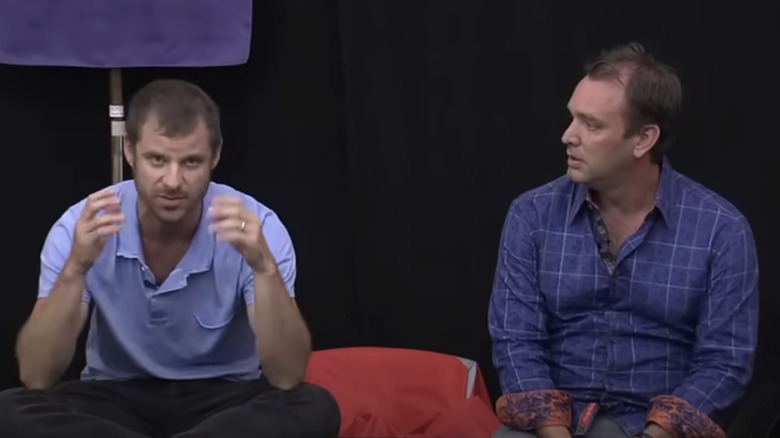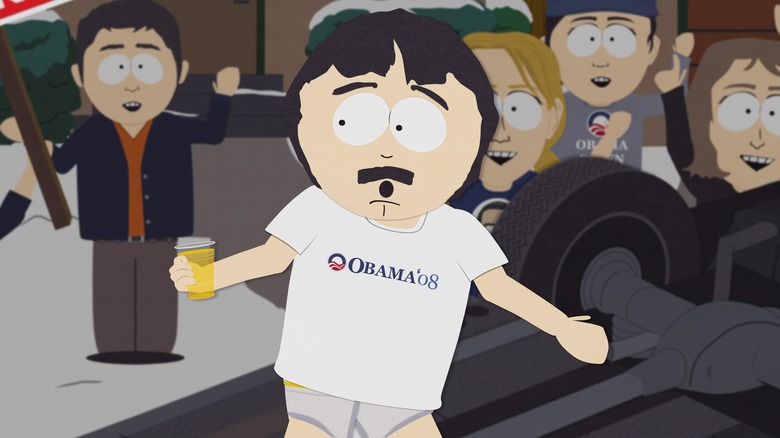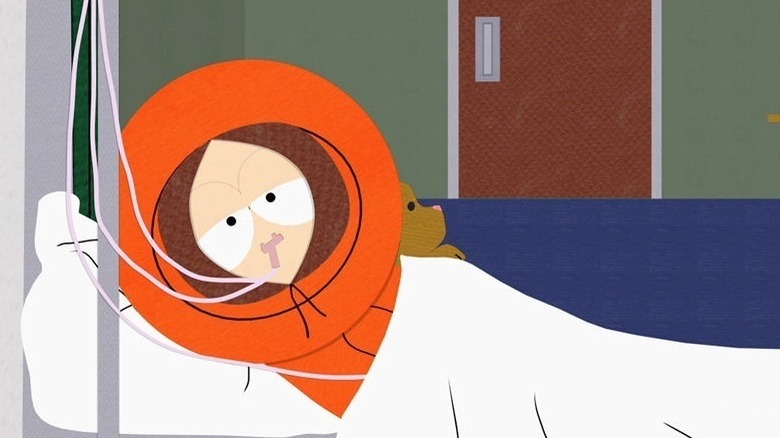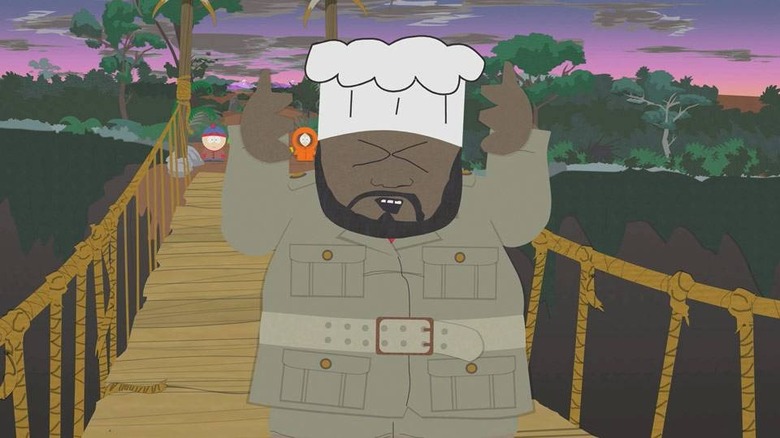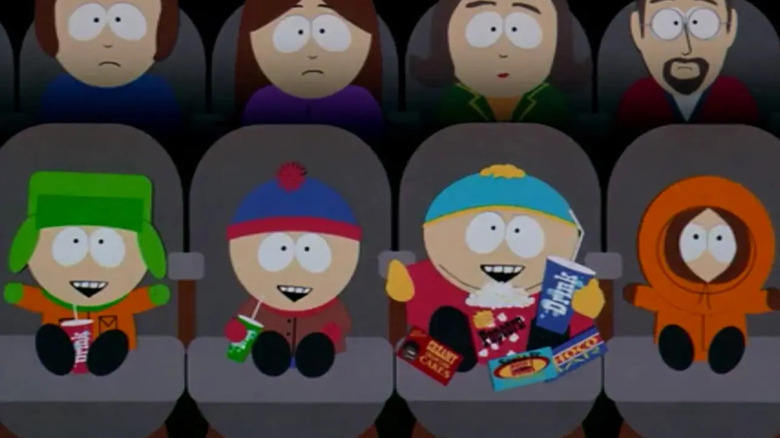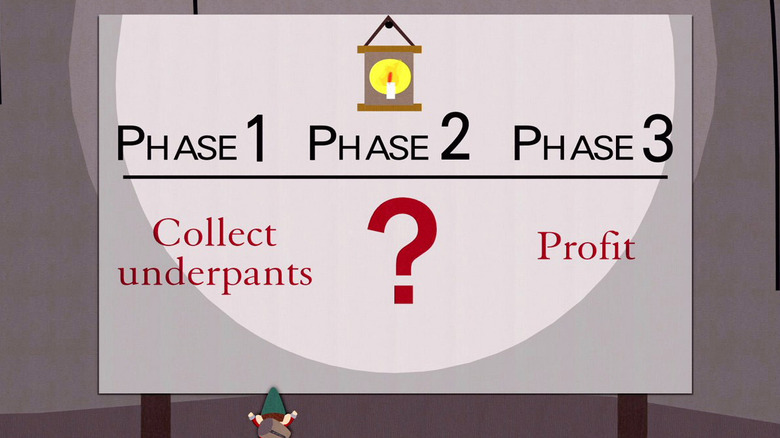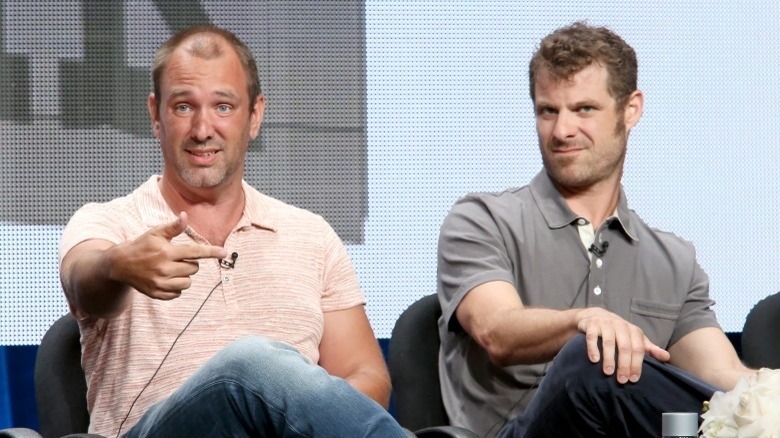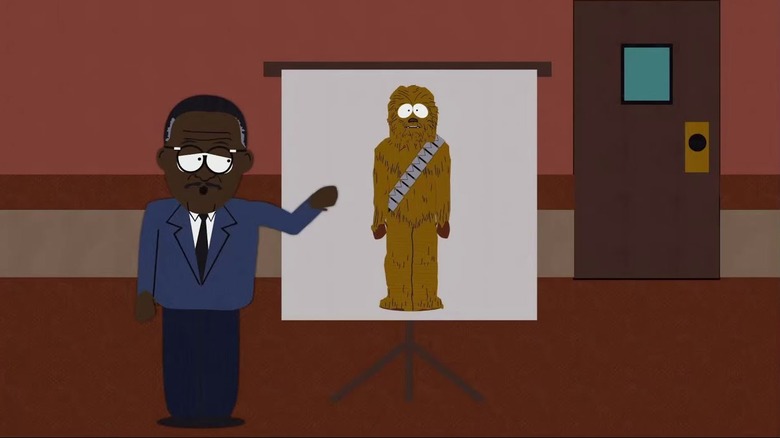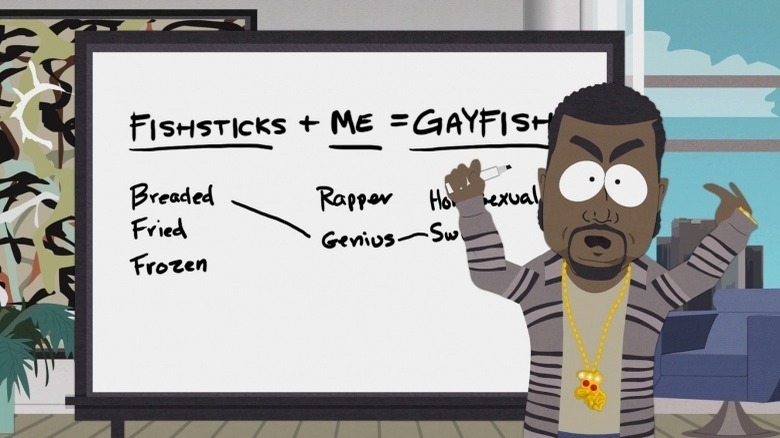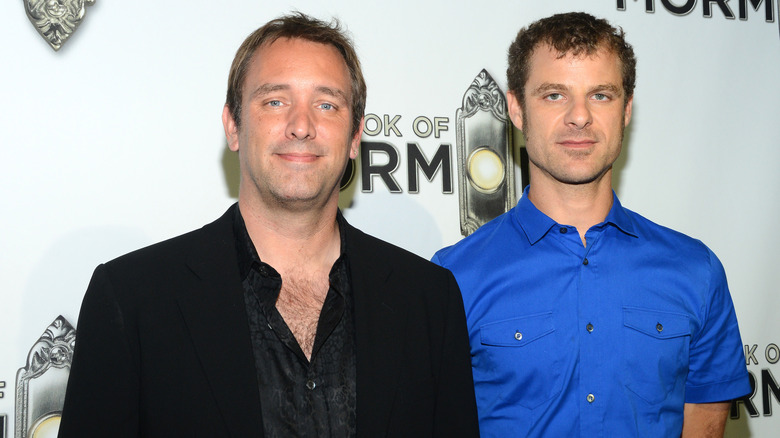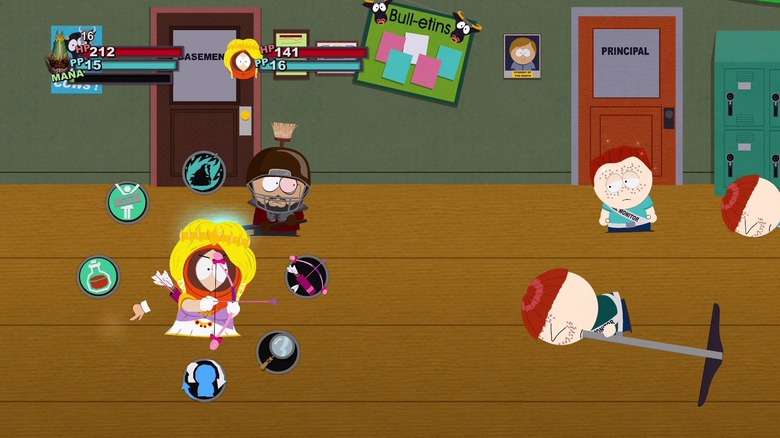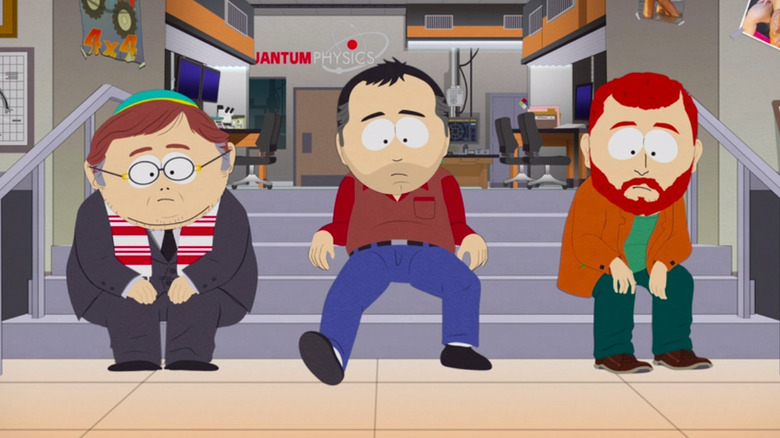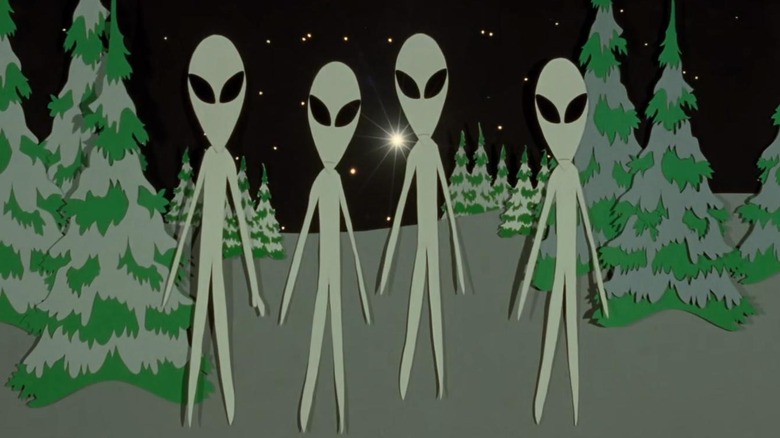The Untold Truth Of South Park
South Park is just as vital and relevant as it was in 1997, when creators Trey Parker and Matt Stone introduced indelible characters like the moralistic Stan, the nightmare child Cartman and the always dying Kenny. The duo have become a comedy brand unto themselves with movies like 2004's Team America: World Police and the hit Broadway musical The Book of Mormon, but here's a look at the little cartoon that started it all.
It started as a viral video
When Parker and Stone were film students at the University of Colorado at Boulder in 1992, they used construction paper, glue, and a very old 8mm camera to create a crude, animated short called The Spirit of Christmas (also known as Jesus vs. Frosty). Featuring a group of foul-mouthed Colorado kids (sound familiar?), it was a massive hit at campus screenings. But Parker and Stone didn't think about it much until they moved to Los Angeles and their indie movie Cannibal! The Musical caught the attention of FOX executive Brian Graden in 1993. He loved The Spirit of Christmas so much that he made 100 VHS copies and sent them as holiday cards. Two years later, Graden gave the pair $2,000 to make another, and they delivered Jesus vs. Santa, which was widely bootlegged around town. George Clooney reportedly distributed 300 copies to his high-powered friends and, within a year, multiple TV networks asked Parker and Stone to pitch a show.
The art style was inspired by Monty Python
The "South Park" creators owe a lot to Monty Python, the British sketch comedy collective who rose to prominence in the 1960s and '70s with their brand of absurd, satirical humor. The group consisted of comedy icons including John Cleese, Graham Chapman, and Eric Idle, whose many projects heavily influenced Parker and Stone throughout the early development process of "South Park." Particularly, the art style of the Comedy Central program was influenced by the typical Terry Gilliam animations that introduced their BBC sketch series, "Monty Python's Flying Circus."
Thankfully, over the years Stone and Parker have had the opportunity to pay their comedy heroes back for inspiring them. In celebration of the sketch troupe's 50th anniversary, they contributed a "South Park" recreation of the iconic "dead parrot" sketch, albeit with Cartman attempting to return a dead Kenny. The troupe's reunion show at the O2 in London in 2014 was also sparked by the "South Park" duo, although Idle jokingly countered this claim in a Reddit AMA, saying "They are arrogant little twerps trying to get cheap publicity off our backs."
Idle's comment was likely in jest, given that the comedian also provided voicework for "South Park: Bigger, Longer, & Uncut," as well as the duo's prior relationship with Gilliam, who once advised the two to not overextend themselves across several projects, which was advice they ignored as they produced "South Park" alongside numerous feature film projects.
The show's marketing was a huge part of its success
The success of "South Park" has been the subject of discussion in the entertainment industry ever since it first premiered. It's not incredibly surprising that the show took off, given its success as a viral video in the Internet's infancy, though the first episode's debut on Comedy Central in 1997 was no accident either. However, test audiences weren't responsive to the series' first episode, "Cartman Gets an Anal Probe," which made the network hesitate in giving the boys a chance to keep producing episodes.
Season 1 was nevertheless the subject of a fierce marketing campaign by Comedy Central as a last-ditch effort to draw attention to it. "South Park" labeled itself as the reason for parents to install a V-chip in their television to monitor their children's viewing habits. Even before the first episode premiered, Comedy Central had already raked in a fortune in T-shirt sales, proving that the series was to be an inevitable success.
"South Park" is also responsible for changing public opinion of Comedy Central as a network entirely, with CNN claiming the animated series "made the Viacom subsidiary a cable industry power almost overnight." It's had as much of an influence on modern-day TV as shows like "The Simpsons," which for a long time was the industry's reigning champion in the adult animation genre, though the appeal of "South Park" to a newer generation made it a surefire success for the network and creators.
Many of the characters are based on real people
They say to "write what you know," but Parker and Stone tend to write about who they know. They drew inspiration from their own lives to create many of the citizens of South Park: Cartman's mom Liane (known for her promiscuity) is named after Parker's ex-fiancée; Butters is based on the duo's childhood friend and South Park animation director Eric Stough; and Cartman is named after their high school friend Matt Karpman. Even Mr. Hankey, the Christmas Poo, comes from Parker's childhood. When he'd forget to flush the toilet, his dad would warn him that Mr. Hankey would crawl out of the toilet and eat him.
They make episodes really fast
While other animated series can take up to a year to produce one episode with the bulk of the animation work shipped overseas, an average episode of South Park has a super-quick production schedule of just six days. That means the show can comment on breaking news almost as fast as live-action shows like Saturday Night Live or Last Week Tonight, but the process can be grueling. Often turning in completed episodes the same day they're scheduled to air, Parker and Stone lead a team that writes, records and animates using a program called Maya. And unlike many other shows that run for 20 years, South Park's creators remain extremely involved in the day-to-day operations. Stone coordinates production, Parker heads up the writing and both provide the majority of the character voices. They've only missed a deadline once: in 2013, when their studios lost power.
Parker and Stone made headlines for almost missing a deadline again in 2016, when they narrowly avoided late delivery on the premiere episode of the much-hyped 20th season. Less than 48 hours before Parker and Stone had to turn the episode in to Comedy Central, they weren't done writing the show, let alone animating it. They were out of ideas for the final third of the episode, and were still brainstorming with staff writers with less than two days to go. Somehow, yet again, they figured it out and ended up getting the show written and animated on time.
Despite their immaturity, their show is rooted in story structure
Despite the quick production schedule that makes "South Park" such a unique case study in TV animation, the show's creators adhere pretty strongly to basic storytelling fundamentals. They detailed their writing process in a guest lecture at New York University, which aired on MTVU's "Stand-In." The main crux of their philosophy revolves around the causality of stories, allowing them to go to extreme places while still making every action true to their respective characters.
During the lecture, Parker firmly instructs the classroom on their use of "but" and "therefore" to connect the plot versus "and then," resulting in a story full of objectives and obstacles. Stone even goes as far as to criticize many popular movies for failing to incorporate simple causality into their screenplays, resulting in movies that are aimless in their narrative.
Another method that the "South Park" writers utilize to come up with story ideas, especially given their tight schedules, is the art of distraction. Parker described using Legos as a distraction to help refresh his brain while trying to be creative for "South Park" in "Beyond the Brick: A Lego Brickumentary." It's no wonder that Parker and Stone are able to get so much done when they combine the efforts of rudimentary knowledge of story structure with the ability to turn their brains off to avoid burnout after working long hours.
They've commented on current events with 24 hours notice
The speed at which the "South Park" production team moves has resulted in some pretty close calls when it comes to episodes airing. One of the most famous examples of this came during the show's 12th season when the team decided to do an episode that would air the day after the 2008 election between Barack Obama and John McCain without knowing who would win.
The episode's production was entirely reliant on Parker's hope that Barack Obama would win, telling The Los Angeles Times that their thought process was "[making] the Obama version, and if McCain somehow wins, we're basically just totally screwed." Thankfully for them, Obama did inevitably win the election, allowing them to proceed with the episode as is, albeit they also incorporated some of his victory speech into the episode by the morning of the day the episode aired.
It was also decided by Parker and the other members of the "South Park" team that the episode's plot would be removed from bipartisan politics and instead feature Obama and McCain attempting to pull off a jewel heist, while the political alignment of each character was decided arbitrarily during production, which some choices meant to play with irony. Thankfully, they didn't have to worry too long about getting the election results wrong, but it makes for one of the luckiest calls by Parker during the production history of "South Park."
Why Kenny had to die
One of the show's earliest catchphrases, "Oh my God, they killed Kenny!," refers to South Park's concept of killing off the main character Kenny in every single episode, only to have him return alive and well at the beginning of the next. It's funny and innovative, but not entirely original. Parker and Stone got the idea from MTV's '90s sci-fi cartoon Aeon Flux, in which the titular spy died in most episodes. Parker and Stone also drew inspiration from one of their childhood friends named Kenny who skipped school so often that rumors spread that he'd died. The cartoon Kenny doesn't always die in later seasons, although he was semi-permanently killed off for a while in season 5 until Parker decided to bring him back. Kenny lives!
They killed off Chef after angering Scientology
"South Park" has lampooned many celebrities over the course of its 26 seasons, garnering more than enough bad blood between the show's creators and certain celebrities. However, one of the series' most notable controversies came during their ninth season, when they parodied the Church of Scientology during the episode, "Trapped in the Closet," which also famously featured a sequence where the show addresses rumors surrounding several celebrity Scientologists being closeted themselves.
However, one person the "South Park" duo probably didn't anticipate angering was Isaac Hayes, the singer-songwriter who played the iconic role of Chef. Also a member of the Church of Scientology, Hayes announced in a statement prior to Season 10 that he would be departing the show for their disrespect of the religion. The matter became the subject of controversy for the show for years to come, with Stone and Parker standing their ground that Hayes had been on board with the show's previous criticisms of religion, but "wants a different standard for religions other than his own," (via Today).
However, the circumstances of Hayes' departure have since been contradicted, with reports that Hayes was also dissatisfied with pay or had suffered a stroke and was in no condition to work. Nevertheless, this meant the end of Chef's time on "South Park," with the character being killed off in the Season 10 premiere after being struck by lightning and mauled by wild animals.
Parker and Stone turned South Park into a feature film
By 1999, "South Park" had been airing on Comedy Central for only two seasons, but had already become a pop culture phenomenon. Naturally, this warranted a transition to the big screen, with Parker and Stone co-producing the first "South Park" feature film: "South Park: Bigger, Longer & Uncut." Parker assumed directorial duties for the film, which he co-wrote with Stone and veteran "South Park" writer, Pam Brady.
The film centers on the typical "South Park" friend group sneaking into an R-rated film of Terrance and Phillip, which gets them to start swearing, resulting in a nationwide panic over the film, causing the United States to declare war on Canada. According to a review for The Washington Post, the movie "takes wicked whacks at targets ranging from Saddam Hussein to the notion that the entertainment industry is chiefly to blame for the pollution of kids' culture."
Despite the film's lampooning of the entertainment industry and censorship, "South Park: Bigger, Longer & Uncut" was a success in its own right. It quickly became the highest-grossing R-rated movie for a time, and even garnered an Academy Award nomination for Best Original Song. However, even the show's Oscar appearance garnered controversy, with ABC censors ironically requesting the performance of the song be altered for airing, while Parker and Stone also showed up to the prestigious ceremony after taking LSD while wearing dresses previously worn by Jennifer Lopez and Gwyneth Paltrow.
The show has inspired many internet memes
Like many shows before and after it, "South Park" has left an indelible mark on Internet humor, as it shaped many generations' childhoods. Particularly, "South Park" storylines and quotes have resulted in some of the most widespread Internet memes of all time, for better or worse. An example of the reach of "South Park" memes is the viral video, "Gingers Do Have Souls," by YouTuber Coppercab, who ranted about the bullying they'd experienced at school as a result of a "South Park" episode where Cartman antagonizes red-haired people, which "South Park" subsequently parodied.
Another meme that took off thanks to "South Park" originates from the Season 2 episode, "Gnomes," which features a recurring joke of tiny gnomes stealing children's underpants. In one scene, the gnomes devise a business plan that consists of three steps: 1) collect underpants, 2) ???, and 3) profit. This joke formula pervaded Internet culture, with many online jokes parodying the formula of several phases of a plan, with one key part in the middle missing before the expectation of benefiting from it.
One such example of this meme being used came from Elon Musk in 2016, when the tech billionaire detailed his plan to colonize Mars, with one phase of his plan jokingly being to steal underpants. Given that "South Park" has spent so many seasons critiquing and satirizing American culture, it's easy to understand how influential it's been towards modern-day Internet humor with countless other meme examples.
Parker and Stone don't do it alone
Most episodes credit only Trey Parker and Matt Stone (or sometimes just Parker) as writers, but South Park employs a large staff of writers and consultants. Lots of famous names have popped in for a residency in the writers room: Bill Hader juggled Saturday Night Live and a burgeoning movie career with writing for South Park; Kristen Schaal (Bob's Burgers, The Last Man on Earth) wrote for a dozen episodes in 2007; The Book of Mormon co-writer Robert Lopez has served as an uncredited consultant; and sitcom legend Norman Lear (creator of All in the Family and Good Times) even dropped by at age 81. Lear served as a creative consultant on the episode where the boys learn Earth is just the set of a reality show created by aliens. Evidently, the man who invented Archie Bunker also brought us the ice cream-pooping taco.
Timmy!
Timmy is confined to a power wheelchair and afflicted with an unspecified condition that includes elements of palsy and Tourette's Syndrome (he has a lot of tics and can only say, "Timmy!"), but Comedy Central reportedly didn't want the character on South Park. Executives were worried Parker and Stone would make fun of people with cognitive disabilities, but the duo countered that the other kids on South Park would treat him as just one of the gang. Fans immediately took to the character, and Parker claimed people began shouting "Timmy!" at him on the street instead of "Oh my God, they killed Kenny!" Many critics praised South Park for including Timmy (and later another physically disabled character, Jimmy) for raising awareness of issues facing the handicapped. In one poll, disabled viewers voted Timmy the "Greatest Disabled TV Character."
South Park coined a legal strategy
Outside the world of Internet memes and pop culture, "South Park" has even influenced the world of law. The show's frequent mocking of celebrities, songs, and moments have drawn plenty of discussion over fair use and parody law, such as one instance where Butters performs "What What (In the Butt)" by Samwell, which resulted in a lawsuit that became a landmark case when it comes to debating copyright.
"South Park" has also pervaded the lexicon of not just American culture, but of the American court system as well. This influence originated in the Season 2 episode, "Chef Aid," which revolves around Chef suing Alanis Morissette for plagiarizing him. Hired by Morissette's record label, celebrity lawyer Johnnie Cochran (who notably defended O.J. Simpson during his widely publicized murder trial), successfully defends his client by using what's now known as the "Chewbacca defense," arguing not against Chef's claims but against the notion that Chewbacca would want to live on the planet Endor after the events of "Return of the Jedi" in an effort to confuse the jury.
Although Chewbacca himself isn't often mentioned in lawsuits, the term "Chewbacca defense" now blankets any argument made by the prosecution or defense that is meant to deliberately confuse the jury. As recently as 2022, the "South Park" episode was referenced during a federal tax fraud case in Jacksonville, Florida, although the argument's efficacy when not employed by Cochran in "South Park" hasn't had much success.
Kanye couldn't take it
One of the things South Park does best is tear down celebrities (if not the culture that makes celebrities out of questionable people in the first place): characters confuse Stevie Nicks with a braying goat; Stan's 45-year-old dad turns out to be teenage pop singer Lorde; and Barbra Streisand is depicted as a city-crushing mecha dinosaur. While most celebrities skewered have silently taken it in stride, Kanye West unsurprisingly did not. In an infamous episode, Kanye doesn't understand a joke about fish sticks and eventually concludes that he must be a gay fish. But the real-life Kanye later dissed South Park in his 2010 song "Gorgeous," citing his intention to "choke a South Park writer with a fish stick."
Their insights on Mormonism eventually took them to Broadway
While Parker and Stone are best known as the minds behind "South Park" for over 20 years, they've also made waves in the world of musical theatre. Along with "Frozen" composer, Robert Lopez, they co-created the smash hit Broadway musical "The Book of Mormon," which premiered in 2011 and starred Andrew Rannells and Josh Gad as two Mormon missionaries who are sent to a poverty-stricken Ugandan village to spread their faith.
Parker and Stone met Lopez after seeing his musical, "Avenue Q," during the production of their film, "Team America: World Police." Together, the trio bonded over their shared interest in Mormonism, with Parker and Stone growing up in a Mormon community in Colorado, where "South Park" also takes place. However, this interest didn't start with "The Book of Mormon," as the duo had previously taken shots at the religion in earlier projects.
In addition to their 1997 movie, "Orgazmo," which features Mormonism, the duo parodied the religion in Season 7 of "South Park." The episode, "All About Mormons," follows a Mormon family moving to South Park, featuring a sequence explaining how Joseph Smith founded the religion, which strongly resembles a key number in "The Book of Mormon." Even Mormons themselves have appreciated the jokes, with one blogger for By Common Consent saying, "South Park argues that the social aspects of our faith may be sufficient unto themselves, regardless of the [efficacy] of our ordinances or the historicity of our scriptures."
The Stick of Truth translated the show to video games
"South Park" has been no stranger to the world of video games, receiving its first playable adaptation in 1998. Over the years, many other "South Park" video games were released, until it eventually became a priority for Parker and Stone to faithfully translate the "South Park" experience into a video game. That dream finally came true with "South Park: The Stick of Truth," which was released for PlayStation 3, Xbox 360, and PC in 2014.
While previous "South Park" video games had experimented with genres like first-person shooters and racing, "The Stick of Truth" is a role-playing game where players control the new kid in town, who becomes involved in a town-wide LARPing session. Though the game was developed by Obsidian Entertainment, Parker and Stone were heavily involved in the game's design, taking heavy inspiration from Nintendo's "Earthbound," another modern-day RPG that Parker particularly loved for "the realness of it" (via The New York Times).
The game's development process was also subject to similar difficulties as the show itself, such as censors in different countries, which resulted in humorous workarounds by the development team, such as one scene where Randy Marsh gets probed by aliens. Nevertheless, like "South Park," "The Stick of Truth" was an incredible success critically and commercially, resulting in a successor, 2017's "South Park: The Fractured but Whole," which trades the medieval roleplay of "The Stick of Truth" for superhero alter-egos.
Their post Covid specials explore the characters' futures
Like the rest of the entertainment industry, "South Park" was affected by the COVID-19 pandemic, though thanks to the production team's quick turnaround time on creating episodes, they were able to release "The Pandemic Special" in September of 2020 as part of their 24th season, focusing on the town's reaction to the pandemic, as well as Randy Marsh's role in spreading it. The one-hour special was followed up in March 2021 with "South ParQ Vaccination Special," continuing the storyline by addressing vaccines and QAnon conspiracies.
Later in 2021, "South Park" extended its deal with Comedy Central to produce the show for up to 30 seasons, including two films that were planned to be released that year. The first of them was "South Park: Post COVID," a one-hour special followed up by a second hour, "South Park: Post COVID: The Return of COVID." Unlike "The Pandemic Special," the "Post COVID" specials did the impossible and took a look at the lives of the show's main cast forty years into the future.
The specials find Stan returning to South Park after Kenny has passed away, resulting in the trio of Stan, Kyle, and Cartman (ironically now a rabbi) reuniting to finish his research on a COVID-19 cure. Eventually, they discover that Kenny has discovered time travel, resulting in Stan and Kyle using it to attempt to prevent the pandemic, which they're unable to do, but improve the lives of everyone they know (except for Cartman).
They celebrated their 25th anniversary with a concert
In 2022, "South Park" celebrated its 25th anniversary, which was cause for celebration for Parker and Stone, who took this celebration to their home state of Colorado, putting on an extravagant concert at the iconic Red Rocks Amphitheater in Morrison. The setlist contained many musical hits from "South Park" history, including the theme song, "Blame Canada" from "South Park: Bigger, Longer & Uncut," and the faux-Kanye West hit, "Gay Fish."
The concert also featured special guests with the appearances of Ween and Primus supporting Stone and Parker throughout the concert. However, the biggest surprises were Geddy Lee and Alex Lifeson from Rush, who surprised not only the audience but Stone, who joined the duo on drums to perform their song, "Closer to the Heart." In their recap of the concert, Variety described a moment where "A man in the audience could be heard saying, 'I've never been happier in my life,'" perfectly encapsulating what this show meant to longtime fans of both "South Park" and Rush.
The once-in-a-lifetime concert was performed across two nights and later made available to watch on Paramount+, and also for free on YouTube. It's a must-watch for any "South Park" fan, as they'll get to see the geniuses behind the show celebrate having one of the most successful animated TV shows of all time for 25 years, with many more anniversaries on the horizon.
Aliens are frequently seen in South Park
Although "South Park" has been on the air for over 20 years, and has become nothing short of a consistent pop culture phenomenon, the show still contains many multitudes and secrets that not even hardcore fans know about. Some of these secrets date back to the show's very first episode, "Cartman Gets an Anal Probe," which was independently developed by Parker and Stone before they had even reached a deal with Comedy Central to get the show produced.
As the episode's title suggests, the story follows the typical quartet of Stan, Kyle, Cartman, and Kenny as they attempt to rescue Stan's baby brother Ike from alien invaders. This episode also began a long tradition for the "South Park" development team of trying to subtly insert the aliens into every subsequent episode of the series. While it began as a fun Easter egg hunt for viewers, the characters never actually appeared in every single episode as some had suggested.
The alien visitors have also appeared much less frequently in recent years, with Huffington Post speculating that "it seems as though the animators found the joke not as interesting," the longer the show continued. Most recently, alien visitors appeared in "South ParQ Vaccination Special" in the 24th season but before that, a visitor hadn't appeared since Season 15's "You're Getting Old." Nevertheless, looking for these characters makes for a great motivation for anyone to continue watching "South Park," even 25 years later.
